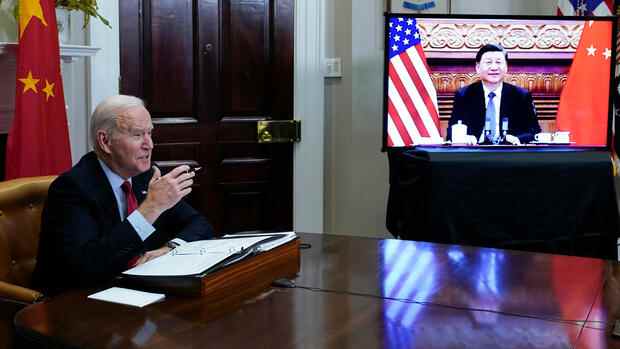Bangkok The competition between the US and China for political and military influence in the Asia-Pacific region is coming to a head. Amid rising tensions, both countries are intensifying their courtship for allies in Southeast Asia.
US President Joe Biden has announced a trip to Cambodia for the coming week, where, according to the White House, he wants to promote cooperation to “guarantee security and prosperity”.
Chinese President Xi Jinping is planning a visit to Thailand shortly thereafter, the government in Bangkok announced this week. The heads of state of the USA and China also want to travel to Indonesia at the same time in the middle of the month.
The reason for the visit offensive are three international summit meetings that are taking place in Southeast Asia within a few days – with the G20 summit on the holiday island of Bali as the highest-ranking discussion forum since the beginning of the Ukraine war. Russia’s President Vladimir Putin may also come to this event.
But in the struggle for a leading role in the strategically important region, both China and the US do not want to rely on diplomacy alone. Both countries are also vigorously pushing ahead with their military build-up in the Asia-Pacific region.
“If we’re not careful, 1914 will repeat itself”
The United States plans to station up to six nuclear-capable B-52 bombers at an air base in northern Australia, multiple media outlets unanimously reported on Monday.
The US aircraft manufacturer Boeing probably developed the B-52 as a nuclear weapons carrier in the late 1940s.
(Photo: IMAGO/CTK Photo)
Australian military strategists see the measure as a warning to China, which would be within range of the bombers. The government in Beijing is also expanding its military capabilities.
According to experts, new photos of artificial islands in the South China Sea show Chinese installations for launching cruise missiles. According to China’s state media, 5,000 soldiers are now living at the military bases far away from mainland China.
>> Read here: “Traitors, Bastards” – How the US alienated close allies
Increasing militarization is raising fears of armed conflict in the region. “I worry about a scenario where two superpowers always assume the worst of each other because of a lack of mutual trust,” Singapore’s Foreign Minister Vivian Balakrishnan said Tuesday at an event hosted by Singapore’s Institute of Southeast Asian Studies.
This increases the probability of an escalation spiral – also as a result of possible miscalculations. “If we’re not careful, there will be a repeat of 1914,” he warned, referring to the start of the First World War.
A spokesman for China’s foreign ministry, responding to reports of US military aircraft being stationed in Australia, said the US had “increased tensions in the region and seriously undermined regional peace and stability”. An arms race is looming.
>> Read here: “Worry extent” – Sharp criticism of Beijing’s attempts to influence German companies
A bilateral meeting between Biden and Xi could take place on the sidelines of the G20 summit in Bali. It would be the first face-to-face meeting between the two heads of state since Biden took office in January last year.
Before that, the US President is planning a visit to the Cambodian capital of Phnom Penh, where he intends to take part in the annual East Asia Summit and a summit between the US and the Southeast Asian community of nations, ASEAN. After Barack Obama, Biden is only the second incumbent US President to travel to the country of 17 million people.
Vice President Kamala Harris will represent Biden at the Asia-Pacific Economic Cooperation summit.
(Photo: IMAGO/ZUMA Wire)
At the Asia-Pacific Economic Cooperation (APEC) summit, which will take place on November 18 and 19 in the Thai capital Bangkok, he will be represented by Vice President Kamala Harris, who will then travel on to the Philippines. In Bangkok, according to the White House, Harris is to “underline America’s commitment to economic cooperation in the Indo-Pacific region”.
Putin has also been invited to Bangkok
However, China’s President Xi, who has confirmed his personal participation in the APEC summit according to the Thai government, should receive more attention. It will be Xi’s first visit to Thailand since he began his presidency ten years ago.
Russian President Putin has also been invited to the Bangkok summit – according to information from Moscow, it has not yet been decided whether he will actually attend.
(Photo: dpa)
Thailand is officially considered an ally of the USA, but under the government dominated by ex-generals it has increasingly sought proximity to Beijing in recent years. Russian President Putin has also been invited to the Bangkok summit – according to information from Moscow, it has not yet been decided whether he will actually attend.
Meanwhile, Xi Jinping has already started to cultivate contacts with his neighbors: On Monday he received Vietnam’s most powerful man, Nguyen Phu Trong, in Beijing. The General Secretary of the Communist Party of Vietnam was welcomed with a televised welcoming ceremony.
>> Read here: Germany’s China policy angers the EU partners – an “industrial association posing as a state”
Xi urged his state guest to “never allow anyone from the outside to interfere in the progress of either country.” Although Vietnam, like China, is governed by a communist regime, it has a dispute with China over islands in the South China Sea and has pushed its rapprochement with the USA in recent years – including in the field of security cooperation.
With the visit to Xi, Vietnam’s leader is now demonstrating that his country by no means wants to put everything on one card – and has by no means written off its relationship with China.
More: Dubious oil imports – How China is overturning sanctions
